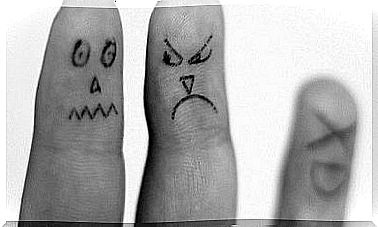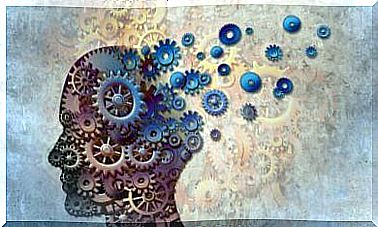How Do Cognitive Distortions Affect Us?

Today, we are going to discover certain mechanisms which act in each of us, which play a very important role and which very often go unnoticed. We could say that they are like the perpetrators of a perfect crime. However, before defining cognitive distortions, we will present a passage from the story of a patient who went to a consultation with her psychologist:
“ Every time I get depressed I feel like I have been hit by a cosmic jolt and I start to see things in a different way. The change can happen in less than an hour. My thoughts turn negative and pessimistic. When I examine my past, I am convinced that nothing that I have been able to do matters.
Any happy period seems illusory to me. My successes seem to be as real as the setting of a western movie. I manage to convince myself that my real personality has no value or meaning. I cannot move forward in my work because the doubt paralyzes me. I can’t be quiet either because the suffering is unbearable ”.

Here we are faced with the case of a patient who complains of depressive symptoms, even though they also resemble anxiety symptoms. In any case, these symptoms are the result of a situation, an event or something that happened to him. Or not.
We used to say that we feel in such a way because such a “thing” has happened, as if one point necessarily leads us to another without us being able to say a single thing. However, we often ignore the thoughts we have or, what amounts to the same thing, these internal messages that we say to ourselves after perceiving a fact.
The role of thoughts or our internal dialogue is fundamental to understanding how we arrived at the emotional state in which we find ourselves. Thus, with regard to our feeling, our thoughts will influence in the same way as the own fact, or even more. If we take a culinary comparison to illustrate this point, the composition of a food will influence the flavor of the food, but we must also not forget to take into account our way of chewing it.
“This way of ‘chewing on the facts’ is what ultimately determines our sadness, our rage, our anger, our joy or our fear.”
Our thoughts lead us to our emotions
The negative thoughts that invade our minds are the real cause of our emotions. They therefore represent the starting point to be taken into account if we want to proceed with good emotional management.
Here is a little exercise to do. Whenever you are feeling down about something, try to identify the thoughts you are having at that moment. Since thoughts create moods, we can change them if we change the way we think.
You may be skeptical of this. Maybe it’s because your negative thinking has become so integrated into your life that it has become automatic. Many thoughts pass through our mind in an automatic and fleeting way, without our being aware of it. They are as obvious and natural as the way we hold a fork.
This is an obvious neurological fact. Before we can experience an event, we must process it in our mind and make sense of it, whether consciously or unconsciously. Thoughts, in general, feed off the dialogues we have with ourselves. This is how this sentence, after centuries of history, takes on its full meaning:
“What troubles men is not the events, but the idea they have of the events.”
-Epictetus-

Differences between rational and irrational thinking
A rational thing is a real, logical, pragmatic, reality-based thing (at least, that’s the meaning we’ll give it in this article). Therefore, it enables people to achieve their goals and objectives (Ellis, 1979).
On the other hand, an irrational thing is a false, illogical thing which is not based on reality and which can prevent people from achieving their most basic goals and objectives (this is also the meaning we will give in this article). Something irrational interferes with our survival and happiness (Ellis, 1976).
Albert Ellis, a psychologist who pioneered cognitive therapy, identified a series of basic irrational ideas that exist in most people. Let’s see some examples of irrational ideas:
- To be loved and approved by almost anyone significant in their community is of dire need of an adult human being.
- The fact that things are not going the way we would like them to go is something terrible and catastrophic.
- Unhappiness arises from external causes. People have little or no power to control their pain and disturbance.
- Some people are vile, malicious and infamous. They should be seriously punished for their wickedness.
There are many more irrational ideas, but we will not expose them all: we will instead focus on cognitive distortions.

What are cognitive distortions?
In our culture, we are bombarded with irrational thoughts. If we listen to songs, watch movies, shows, series, we find a huge number of irrational thoughts that we can incorporate, if we haven’t already, into our own beliefs.
It doesn’t mean that we have to stop watching TV, listening to music, or that we have to move away from society. Above all, we need to question what we listen to or see on television and reflect on these ideas before adding them to our beliefs and values.
“There are three monsters that keep us from moving forward: I have to do this right, you have to treat me well and life should be easy.”
-Albert Ellis-
Thus, cognitive distortions or thinking errors are biased thoughts about the reality around us. They are often automatic and we may have trouble realizing that we have them. This is why the help of a specialized psychologist can be very useful. The next step, after identifying them, would be to trade these distortions for more “realistic” or adaptive thoughts.
Cognitive distortions are responsible for making us feel sad, anxious, angry, etc. If we can identify and change them, we will feel better.

Types of cognitive distortions
The “all or nothing” thought
It is a distortion that makes us perceive everything in an extremist way, without any intermediary element. This is the typical “all or nothing” or “black and white” thinking. We believe that things can only be good or bad, that a person must be perfect or else it will be a failure. For example: “Either I am successful in everything I do, or I am completely useless”.
Excessive generalization
It is about drawing general conclusions from particular facts: if, on one occasion, something negative has happened, it is to be expected to happen again every time. For example, if a young person is rejected by a young girl, he may generalize and say that all women will do the same in the future.
Mental filter
The person chooses one negative detail in each situation and focuses exclusively on it: the whole situation will eventually turn negative. For example: the wife who sees only that her husband is messy and does not comment on some of his aspects which are much more positive (“responsible”, “hardworking”, “gentle”, among others).
Thought reading
It is a matter of assuming the reasons or intentions of other people, taking this interpretation as the only valid one when there are others that are also possible. We think we are guessing exactly what other people are thinking and most of the time we are wrong. This means that we make hasty conclusions by reading the thoughts of others. For example: “he is not paying attention to me, what I say should not interest him”. It is one of the most common cognitive distortions when we relate to others.
Customization
It is the tendency to tie something from our environment to ourselves. That is to say, we think that everything revolves around us, and that is why we often distort the facts. Another type of personalization appears when we compare ourselves to others. For example, if someone makes an open comment about people’s irresponsibility, we will consider that comment to be for us. The person who is very sensitive to personalization believes that they are constantly the target of indirect sentences.
Emotional reasoning
The root of this distortion lies in the belief that what the person feels must be proof of the truth. We take our own emotions for evidence when we have no objective evidence. For example: “if I feel like I’m a loser, that means I’m really a loser”.
Hasty conclusions
This is a distortion that prompts us to draw certain conclusions without having taken into account all the necessary data. Therefore, the conclusion we reach is arbitrary and unfounded. For example: “I am sure that the meal I am preparing will not please my family”.
Exaggeration and minimization
The exaggeration occurs when we focus on our mistakes, our fears or our imperfections and are emphasizing their importance: “My God, I made a mistake. It’s horrible, what will become of me! ”. The minimization happens when we remove importance to our qualities, “I am no more talented or more intelligent-e-e than that in mathematics. Having had 18 on the exam doesn’t prove anything ”.
“The mind that opens up to a new idea will never return to its original size.”
-Albert Ellis-
The “we should”
In this distortion, the person acts according to certain inflexible rules that should govern each person’s relationships. The words that indicate the presence of this distortion are “we should”. With this rule, it is not only others who are judged, but the person who also uses them with himself… For example: “Others should understand me, they should not treat me in this way”, “you shouldn’t behave this way ”…
The label
This is an excessive generalization taken to the extreme. Instead of describing the mistake we made, we put a negative label on ourselves: “I’m a loser”. When we don’t like someone’s behavior, we put another negative label on them: “He’s a dirty liar”.

The way to fight our irrational thoughts goes through several elements:
- Realize when we feel bad.
- Identify the thoughts that present themselves in our mind at this precise moment.
- Evaluate whether they correspond to certain cognitive distortions that we have just presented.
- Exchange them for more adaptive thoughts, modifying our language and our internal dialogue.
In one way or another, we have all been victims of one or more of these cognitive distortions and we will continue to be. The more we get to know them and understand how they work, the more we can control their effect, or even turn them in our favor.









